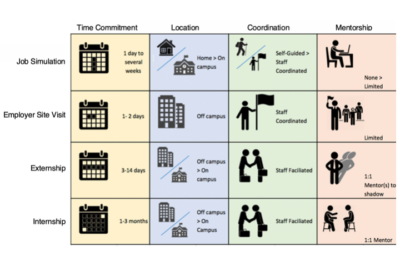Think flexibly about an internship

https://www.lifescied.org/doi/10.1187/cbe.19-12-0270
Experiential learning is an effective educational tool across many academic disciplines, including career development. We’re rethinking and expanding the training of predoctoral graduate students and postdoctoral scholars to include experiential learning opportunities. A newly published article, resulting from collaboration across nine institutions across the USA, provides an overview of four types of experiential learning approaches, compares the learning objectives, and offers evaluation strategies for each type. We also discuss key factors for shaping experiential learning activities on an institutional level. This framework can help organizations (and individuals) determine which form of experiential learning for career training might best suit their goals.
In this article, we describe the range of experiential learning approaches our institutions offer and classify them into four types: job simulations, employer site visits, job shadowing, and internships. We compare the structure, duration, resource requirements, learning objectives, and assessment strategies employed for each type.
At Cornell, many of these activities take the form of individualized experiences aimed at meeting your specific needs. A key element of these experiences is that you are empowered to make them your own, often for the benefit of many others. These activities can take the form of job simulations, employer site visits, shadowing, or internships. Sometimes activities to explore a career option fall into several of these categories. Increasingly, alumni from the Careers Beyond Academia Program are sharing and working with us to co-create opportunities, too!
- Job simulations: Job simulations immerse participants in tasks required by a particular career to help determine whether or not the job feels like a good fit. They can take place within a workshop, class, on campus, or at home.
- Employer site visits: Site visits allow participants to get a feel for whether a work environment or an organization might be a good match. Observing the actual workplace and networking with employees can affect your decision to pursue an opportunity. These can be on-site or virtual.
- Shadowing: Shadowing allows participants to observe professionals in their work environments to gain a better sense of a given job’s responsibilities. It might take place in an afternoon or in several days over the course of a semester, and might include project participation.
- Internships: Internships are an immersive way to try a career while gaining hands-on work experience. These experiences might emanate from one of the above, and might take place on- or off-campus over the course of a few weeks or months. Flexible internships might even take the form of a few hours a week over the course of several semesters, and can include on-site and/or remote involvement.
To access the full article.
Title: Applying Experiential Learning to Career Development Training for Biomedical Graduate Students and Postdocs: Perspectives on Program Development and Design
Authors: AV Wart, TC O’Brien, S Varvayanis, J Alder, J Greenier, RL Layton, CA Stayart, I Wefes, and AE Brady
Affiliations: Virginia Tech, UCSF, Cornell, Rutgers, UCDavis, UNC Chapel Hill, UChicago, UColorado Denver–Anschutz, Vanderbilt


